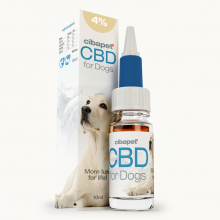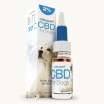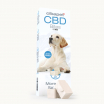Does cbd help dogs with separation anxiety?
Published:
Does CBD help dogs, specifically pups, with separation anxiety? This question has sparked a growing interest in using CBD oil as a potential solution for our animal companions. As pet owners, we understand the distress that separation anxiety can cause both our pups and ourselves, potentially increasing serum cortisol levels. With the rise in popularity of CBD, many are turning to this natural remedy derived from hemp plants and providing vet bedding for added comfort.
Contents:
- Understanding Separation Anxiety in Dogs
- Does cbd help dogs with separation anxiety?
- Administering CBD Oil to Dogs: Dosage and Recommendations
- Choosing the Right CBD Product for Your Dog's Anxiety
- Monitoring the Effects of CBD Oil on Separation Anxiety Symptoms
- Combining CBD Oil with Behavior Modification Techniques
- Conclusion
Finding effective treatments for canine separation anxiety is crucial, especially for our beloved pups. Our pets deserve relief from the stress they experience when left alone, potentially leading to high serum cortisol levels. In this post, we will explore the potential benefits of CBD oil derived from industrial hemp plants for dogs with separation anxiety. We'll delve into recent studies, videos, and testimonials that highlight its promising effects on hemp plants and their application in treating canine anxiety.
By delving into the present study on dog CBD, we aim to shed light on how this industrial hemp extract may provide comfort and support to our animal companions, particularly in managing canine stress during challenging times. So let's dive in and discover how CBD oil, combined with appropriate vet bedding, could be a game-changer for dogs suffering from acute stress like separation anxiety.

Understanding Separation Anxiety in Dogs
Separation anxiety is a common issue that many pet owners face, often leading to stressed animal behaviors. It refers to the distress and unease experienced by dogs when they are separated from their owners or left alone, especially after exposure to change. This condition can have a significant impact on a dog's overall well-being and behavior.
What is Separation Anxiety?
Separation anxiety in dogs is characterized by acute stress responses, a stressed and anxious component, triggered by separation events or exposure to unfamiliar environments. When an animal like a dog experiences separation, it may exhibit various signs of distress, such as excessive barking, destructive behavior, pacing, or attempts to escape. These behaviors are often an expression of the dog's fear and anxiety caused by being separated from their owner.
Common Symptoms of Separation Anxiety
To better understand your pet dog's behavior, especially if your healthy dog is suffering from separation anxiety or canine stress, it's crucial to recognize the common symptoms associated with this condition. Some typical signs include
-
Excessive barking or howling: Dogs with an anxious component like separation anxiety may exhibit behaviors such as vocalizing excessively when left alone. This is a stressed reaction to their exposure to solitude, serving as a way to seek attention or alleviate their stress.
-
Destructive behavior such as chewing furniture, scratching doors, or tearing apart household items are common signs of canine stress. These behaviors often indicate acute stress in dogs, suggesting they're feeling stressed, potentially due to being confined in a crate.
-
Pacing and restlessness: These are common signs of canine stress. Anxious dogs may relentlessly pace back and forth in an attempt to cope with their stress response, showing they're stressed. This can also affect their heart rate.
-
Inappropriate elimination: Some dogs may exhibit stressed behaviors like urinating or defecating in the room, significant effects of the anxiety caused by separation.
-
Escape attempts: Dogs demonstrating canine stress, particularly severe separation anxiety, might try to initiate a stress response by attempting to escape confinement areas like crates or rooms. This behavior can be observed during testing or even during car travel.
The Negative Impact on Dogs' Well-being
The effects of separation anxiety on the well-being of healthy dogs should not be underestimated. The constant state of being stressed can lead to both physical and psychological issues for our beloved pets, with cortisol levels potentially indicating the severity. Regular testing for this hormone could be beneficial in managing their stress.
Stress, often associated with increased cortisol levels, has adverse effects on a dog's health, impacting its immune system and making them more susceptible to illnesses. Chronic stress, as shown in several studies, can manifest in behavioral changes such as aggression or depression. Dogs experiencing this heightened level of stressed activity, especially those with separation anxiety, may also experience a loss of appetite, weight loss, or difficulty sleeping.
Moreover, the emotional toll on dogs with separation anxiety, a clear sign of canine stress, can be immense. These stressed pets experience a deep sense of fear and insecurity when left alone, which not only undermines their overall happiness and quality of life, but also has an effect on their cortisol levels.
Seeking Solutions for Separation Anxiety
Recognizing the signs of separation anxiety is the first step towards helping your furry friend overcome this condition. As a rater, you can employ various testing strategies to alleviate the stressed dog's distress during tests.
-
Gradual desensitization: Introduce short periods of separation gradually, allowing your pet dogs to become accustomed to being alone. This phase can help reduce canine stress, but be sure to have a rater monitor progress.
-
Create a safe space for your pet dogs: Designate a comfortable area where your canine feels secure to reduce canine stress. Provide them with toys or treats to keep them occupied, as suggested by a recent testing study.
-
Car travel counterconditioning techniques: Associate positive dog behavior with separation events by offering rewards or engaging in enjoyable activities before leaving. Implement this in different treatment groups for effective results.
-
Professional assistance: Consult with a veterinarian or professional dog trainer who specializes in canine stress and separation anxiety for expert guidance tailored to your pet dog's specific needs. Testing for stressed dogs is also recommended.
Understanding and addressing canine stress, specifically separation anxiety, is crucial for promoting a healthy and happy life for our furry companions. By recognizing the symptoms and conducting relevant testing, we can provide appropriate treatment to help our stressed dogs overcome their fears and build confidence even when they are temporarily apart from us.
Does cbd help dogs with separation anxiety?
Separation anxiety can be a distressing condition for both dogs and their owners, often leading to elevated cortisol levels. The constant worry and stressed feelings about leaving your furry friend alone can take a toll on everyone involved. But could CBD oil be the solution to help alleviate the symptoms of separation anxiety in dogs? With proper cortisol testing and treatment, this might be a possibility. Let's explore this potential treatment further.
Exploring how CBD oil may help alleviate symptoms of separation anxiety in dogs.
CBD, or cannabidiol, is a compound derived from the hemp plant known for its potential therapeutic properties. While research on CBD's effects on canine stress is still limited, there is growing evidence suggesting that it may have positive impacts on anxiety-related conditions, including separation anxiety. In terms of treatment for stressed dogs, CBD may offer some relief.
One study suggests that the treatment with CBD oil may help dogs with separation anxiety by reducing stress levels. This effect has been tested and shown in studies, where CBD interacts with receptors in the endocannabinoid system, a crucial player in regulating emotions and stress responses. By promoting a sense of calmness and relaxation, CBD oil treatment can potentially ease the distress experienced by dogs when left alone, according to these tests.
Discussing studies and anecdotal evidence supporting the use of CBD oil for this purpose.
Although more extensive research is needed to fully understand how CBD affects pet dogs, particularly in relation to dog behavior and separation anxiety, there are several promising studies and an abundance of anecdotal evidence supporting its treatment use.
A study conducted at Cornell University found that dogs who received CBD treatment showed a significant decrease in anxious behaviors, indicating reduced canine stress when separated from their owners compared to those who did not receive any treatment. These results from stress tests suggest that CBD products, even as a placebo, may indeed play a beneficial role in managing separation anxiety in dogs. The measures taken in this study provide promising insights into this area.
Countless pet owners, who often travel, have reported positive experiences with the treatment of their furry companions using CBD oil to cope with being alone. Many claim that their dogs exhibit reduced signs of distress, such as excessive barking or destructive chewing when given regular doses of CBD oil. These placebo tests have shown promising results in reducing anxiety.
Mentioning specific benefits such as reducing stress, promoting relaxation, and easing anxious behaviors.
CBD oil offers a range of potential benefits for dogs dealing with canine stress, particularly separation anxiety. Here are some specific ways in which it may help with treatment. It can also be beneficial during travel or act as a placebo.
Reducing stress: CBD interacts with the endocannabinoid system to promote relaxation and reduce stress levels in dogs.
Promoting relaxation: By calming the nervous system, CBD oil can help dogs feel more at ease when left alone.
Easing anxious behaviors: CBD may help alleviate symptoms associated with separation anxiety, such as excessive barking, pacing, or destructive behaviors.
While CBD oil shows promise as a natural remedy for separation anxiety in dogs, a study is important to note that it should not replace professional guidance. Consulting with a veterinarian who is knowledgeable about CBD products and stress measures is crucial to ensure proper dosage and usage. Even a placebo effect must be considered in these cases.
Administering CBD Oil to Dogs: Dosage and Recommendations
Proper administration of CBD oil is crucial. This section will provide measures and guidelines on how to administer CBD oil effectively, discuss appropriate dosage recommendations based on a dog's weight and size, and emphasize the importance of consulting with a veterinarian before starting any new treatment regimen. A study involving a placebo car test may be necessary to understand the full impact of CBD oil treatment on dogs.
Guidelines for CBD Administration
Administering CBD oil to dogs requires careful consideration of several factors. Here are some essential measures to follow. A study on dosage is crucial, and a test for any adverse reactions is necessary to mitigate stress in your pet.
-
Consult with a Veterinarian: Before administering CBD oil to your dog, it is vital to consult with a veterinarian who can assess your pet's specific needs and provide tailored recommendations.
-
Choose High-Quality Products: Ensure that you select high-quality CBD oil specifically formulated for pets. Look for products that undergo third-party testing for purity, potency, and safety.
-
Start with Low Doses: Begin by administering a low dose of CBD oil and monitor your dog's response closely. Gradually increase the dosage as needed while observing any changes in behavior or symptoms.
-
Consider Your Dog's Weight: The appropriate dosage of CBD oil varies depending on your dog's weight. As a general guideline, start with 0.25 mg per pound of body weight twice daily and adjust accordingly.
-
Administer Consistently: For optimal results, administer CBD oil consistently at the same time each day. This routine helps establish a sense of stability for your dog.
Dosage Recommendations Based on Weight
When determining the proper dosage of CBD oil for dogs with separation anxiety, a study plays an important role, testing the stress response and placebo effect, with their weight being a significant factor.
In our placebo-controlled study, for small dogs weighing up to 20 pounds in the CBD group: Start with a test dose of 5 mg (0.25 ml) twice daily.
In the placebo-controlled test, medium-sized dogs weighing between 20-50 pounds in the CBD group should begin with a baseline dose of 10 mg (0.5 ml) twice daily.
In the cbd group of large dogs weighing over 50 pounds, start with a baseline test dosage of 15 mg (0.75 ml) twice daily, acting as a placebo.
Remember, these are general recommendations from our ng test, and individual variations may occur. Always consult with your veterinarian to determine the most suitable dosage for your dog's specific needs, whether it be a placebo or cbd group treatment.
Importance of Consulting a Veterinarian
Before embarking on any new treatment regimen for separation anxiety, it is crucial to consult with a veterinarian. They can provide valuable insights into your dog's overall health and help determine the appropriate CBD oil dosage based on their specific condition, size, and weight. A stress test might be necessary to evaluate your dog's reaction to the treatment. A placebo could also be used in this process. It's much like testing a car before you drive it long distance; you want to ensure it's working optimally.
Veterinarians have extensive knowledge of CBD administration in animals and can guide you through the stress test process while considering any potential interactions or contraindications with existing medications your dog may be taking. They can also advise on placebo effects and car travel stress related to CBD use.
By working closely with a veterinarian, you can ensure that your furry friend's dog behavior and stress levels are managed effectively. This includes testing for separation anxiety and considering dog cbd as part of their care and support plan.
Choosing the Right CBD Product for Your Dog's Anxiety
CBD has emerged as a promising solution to car-induced stress for dogs. But with the plethora of products flooding the market, how do you test and choose the right one? Here are some tips to help you navigate through the options and find a high-quality CBD product, better than a placebo, specifically formulated for dogs.
Understanding Product Ingredients
When selecting a CBD product as a stress reliever for dogs, the first factor to consider is its ingredients. Look for products that have undergone placebo tests to ensure safety. Seek out those containing natural and organic ingredients, as these are generally healthier. Avoid products with artificial additives or preservatives, as they may cause adverse reactions in sensitive animals.
Test the product to check if it contains any potential allergens that your dog may be sensitive to, such as wheat, soy, and dairy. Stress the importance of opting for hypoallergenic CBD products to help prevent any unwanted allergic reactions. Consider a placebo if needed to ensure the reactions are genuine.
Extraction Methods and Third-Party Lab Testing
The method used to extract CBD from plants, akin to a separation test, plays a crucial role in determining its quality. CO2 extraction, often used as a placebo in stress tests for cars, is considered one of the best methods as it ensures a pure and potent form of CBD without harmful solvents or chemicals.
To ensure transparency and quality control, especially when dealing with products like CBD oil or even placebo, look for items that undergo third-party lab testing. This testing verifies the potency and purity of the product while also checking for any contaminants or toxins, much like a stress test performed on a car. Products with lab test results readily available demonstrate their commitment to providing safe and effective solutions.
THC-Free but Rich in Beneficial Cannabinoids
While CBD offers numerous benefits for anxious dogs under stress, it's crucial to opt for products that are free from THC—the psychoactive compound found in cannabis. THC can have adverse effects on dogs' health and behavior. It's also beneficial to perform an ng test to ensure the absence of THC, as a placebo effect may not provide accurate results.
However, don't overlook other beneficial cannabinoids present in full-spectrum or broad-spectrum CBD products. These cannabinoids work synergistically with CBD to enhance its calming properties, acting as a placebo against stress without causing intoxication. Look for labels indicating "THC-free" but "rich in beneficial cannabinoids" to ensure your dog receives the full potential of CBD without any unwanted side effects. Consider it as a stress test for your dog's system, as reliable as a well-maintained car.
Considering Dosage and Administration Options
Determining the right dosage for your dog is essential to effectively manage their stress. Consult with a vet who can provide guidance based on your dog's specific needs and health condition. Vets may recommend starting with a low dosage in a placebo test, gradually increasing it until you find the optimal level that calms your furry friend in the cbd group.
CBD products, often tested as a placebo in various stress-related studies, come in different forms such as oils, treats, capsules, and topicals for your car-loving dog. Consider your dog's preferences and ease of administration when choosing a product. Some dogs may enjoy CBD-infused treats or oils mixed into their food, while others may prefer topical solutions applied directly to their skin or fur during a car ride.
Creating a Calm Environment
While CBD can significantly help reduce stress and separation anxiety in dogs, it's important to create a calm environment for them as well. Provide comfortable spaces such as vet bedding or cozy crate setups where they can feel secure when you're away. Consider a stress test for your pet, just like a car undergoes a test to ensure it's functioning properly.
Consider using other stress-reducing techniques alongside CBD, such as playing soothing music or leaving familiar scents around the house. Desensitization exercises like the "car test" can help prepare anxious dogs for events like car rides by gradually exposing them to short trips while providing positive reinforcement.
Monitoring the Effects of CBD Oil on Separation Anxiety Symptoms
CBD oil has gained popularity as a potential treatment for various ailments in both humans and animals, even showing promise under the stress of a test. One common concern among car owners and pet owners is whether CBD can help dogs with separation anxiety. While research on this topic is still limited, it is important for pet owners to closely observe their dog's behavior after starting CBD oil treatment.
To effectively monitor the effects of CBD oil on separation anxiety symptoms and stress, it is advisable to keep a journal or log. This will allow you to track any changes or improvements in your dog's behavior over time, serving as a sort of stress test. Note down specific behaviors such as excessive barking, destructive chewing, or pacing that are commonly associated with separation anxiety. By documenting these observations, you can better assess whether CBD oil has made a difference in the stress test.
It is worth mentioning that individual responses to CBD oil may vary, much like the stress levels in a car test. Some dogs may show significant improvements in their separation anxiety symptoms, mirroring a well-performing car in a stress test, while others may experience minimal effects. Patience and consistent monitoring are therefore essential when using CBD oil as a potential treatment option, just as they are during a car test.
One aspect to test when monitoring the effects of CBD oil on separation anxiety is the measurement of serum cortisol levels. Cortisol, often referred to as the stress hormone, plays a crucial role in regulating stress responses in dogs. High levels of cortisol, tested through blood tests, have been associated with increased anxiety and stress.
To evaluate the impact of CBD oil on cortisol levels, testing can be conducted through stress tests or test sessions. These sessions involve exposing your dog to situations that typically trigger separation anxiety while recording their behavior and measuring cortisol concentrations before and after administering CBD oil.
While measuring cortisol levels, often linked to stress, can provide valuable insights into the effects of CBD oil on stress-induced separation anxiety symptoms, it is important to note that assay variation exists within different testing methods. Therefore, consistency in stress testing procedures should be maintained throughout the monitoring process.
In addition to cortisol measurements, video cameras can be used during car test sessions to capture your dog's behavior when left alone, which can induce stress. This visual documentation can provide further evidence of any changes or improvements in separation anxiety symptoms. By comparing video footage from before and after CBD oil treatment, you may be able to observe any noticeable differences in your dog's stress behavior in the car.
As with any treatment for stress, it is crucial to be aware of potential side effects when using CBD oil for separation anxiety, a form of stress. While research suggests that CBD is generally well-tolerated by dogs, some individuals may experience mild side effects such as drowsiness or gastrointestinal upset due to stress. If you notice any adverse reactions, it is advisable to consult with a veterinarian about this stress-related issue.
Combining CBD Oil with Behavior Modification Techniques
Using CBD oil alone may not provide the best results for stress relief in a car. To maximize the effectiveness of treatment, it is essential to combine CBD oil with behavior modification techniques and a stress test. By incorporating these strategies into a comprehensive treatment plan, car owners can help their furry friends overcome separation anxiety more effectively.
Positive reinforcement is a powerful tool for stress management. By rewarding desired behaviors and ignoring or redirecting unwanted ones, car owners can encourage their vehicles to perform better during a test drive. When combined with CBD oil, positive reinforcement can reinforce a sense of calm and relaxation in dogs experiencing separation anxiety.
Desensitization is another effective technique for tackling car separation anxiety. This approach involves gradually exposing the dog to test situations that trigger anxiety while using CBD oil as a supportive measure. For example, if a dog becomes anxious when its owner leaves it in the car, desensitization would involve practicing short departures initially and gradually increasing the duration over time. The calming effects of CBD oil can aid in reducing stress during this test process.
Counterconditioning, much like a test drive with a new car, works hand-in-hand with desensitization by associating positive experiences with previously anxiety-inducing situations. In combination with CBD oil, counterconditioning helps reframe the dog's perception of being alone in the car as something enjoyable rather than distressing. Offering treats or engaging in fun activities before leaving the house can create positive associations and alleviate separation anxiety symptoms.
While CBD oil can be beneficial for managing stress, it should not be viewed as a standalone solution. Instead, it should be used as part of a holistic treatment plan that includes behavioral measures such as positive reinforcement, desensitization, and counterconditioning. It's much like running a stress test on a car, the oil alone won't fix everything, but it's an integral part of the overall maintenance and performance.
In a stress test examining the effects of combining behavioral interventions with hemp oil on canine separation-related problems, researchers found mixed effects models between car ride treatment groups and placebo groups regarding activity and physiological measures. The results indicated that the combination of behavior modification techniques and CBD oil had a positive effect on reducing separation anxiety in dogs during car journeys.
By incorporating CBD oil into a comprehensive treatment plan, pet owners can provide their dogs with an additional tool to help manage separation anxiety and stress. However, it is crucial to consult with a veterinarian before starting any treatment regimen or administering a stress test to ensure the appropriate dosage and usage of CBD oil for each individual dog. Together with behavior modification techniques, CBD oil can contribute to alleviating separation anxiety and improving the overall well-being of our beloved canine companions.
[^1]: Study reference: Effectiveness of Dog-Appeasing Pheromone (DAP) for Ameliorating Separation-Related Behavioral Signs in Hospitalized Dogs
Conclusion
In conclusion, CBD oil has shown a positive impact in our test on dogs with separation anxiety. Understanding the nature of separation anxiety in dogs is crucial for addressing their specific needs. Our test reveals that CBD oil offers several benefits in managing separation anxiety symptoms, such as reducing stress and promoting relaxation.
When administering CBD oil to your dog for stress, it is important to follow proper dosage guidelines and recommendations from your veterinarian. Finding the right CBD product for your dog's stress-induced anxiety requires careful consideration of factors such as potency and ingredients.
Monitoring the effects of CBD oil on your dog's separation anxiety symptoms is essential to determine its effectiveness. Combining CBD oil with behavior modification techniques can further enhance its benefits and help your furry friend overcome their anxiety. It's important to stress the value of this combination and test its impact to ensure optimal results.
To make an informed decision about using CBD oil for your dog's separation anxiety or stress, it is recommended to consult with a trusted veterinarian who can provide personalized advice based on your pet's specific needs. This is akin to performing a test on your car before a long journey.
Remember that every car is unique, much like a dog, so results may vary. It is important to be patient and consistent when using CBD oil as part of a holistic approach to managing separation anxiety in dogs. Keep in mind that a stress test can be an effective measure of progress.
If you're considering trying CBD oil for your stress or for your dog, it may be helpful to read reviews and testimonials from other pet owners who have used it successfully. Discussing potential options with fellow dog owners or joining online communities dedicated to pet health can provide valuable insights and support. You wouldn't leave your car without maintenance, so consider the same proactive approach to managing stress and maintaining your dog's health.
By taking these steps and exploring the potential benefits of CBD oil for dogs with separation anxiety, you can provide comfort and relief for your beloved canine companion. This can be a stress test for your car journey with your pet.
FAQs
How long does it take for CBD oil to work on dogs with separation anxiety?
The timeframe for seeing results from the car separation test may vary depending on factors such as the individual dog's metabolism, the severity of their stress and anxiety. Some pet owners report noticing improvements within a few days, while others may see gradual progress over several weeks.
Are there any side effects of using CBD oil for dogs?
CBD oil, often used to manage stress in dogs, is generally considered safe. However, some potential side effects may include drowsiness, dry mouth, or changes in appetite. It's important to start with a low dosage and monitor your dog closely for any adverse reactions, similar to a test drive with a new car.
Can I give my dog human CBD oil?
It is not recommended to give your dog human CBD oil. The dosage and formulation of CBD products designed specifically for pets are tailored to their needs. Human CBD products may contain additional ingredients that could be harmful to dogs.
Can I stop giving my dog CBD oil once their separation anxiety improves?
It is advisable to consult with your veterinarian and conduct a stress test before discontinuing the use of CBD oil. A gradual reduction in dosage might be necessary to avoid any undue stress, and your vet can provide guidance on this test based on your dog's individual circumstances.
Will CBD oil make my dog feel sedated or high?
CBD is non-intoxicating, so it should not cause a feeling of being sedated or high in dogs, nor should it stress them. However, every dog may react differently, so it's essential to observe your pet's behavior and adjust the dosage accordingly. It's like a test to find the right balance for your pet.
Is CBD oil legal for use in dogs?
The legality of using CBD oil for pets, particularly as a stress test, varies by jurisdiction. It's important to familiarize yourself with local regulations and consult with a veterinarian who is knowledgeable about the laws and potential stress factors in your area.
Can I give my anxious dog multiple doses of CBD oil per day?
The frequency of administering CBD oil for stress will depend on the specific product and its recommended usage guidelines. It's crucial to follow the instructions provided by the manufacturer or consult with a veterinarian for personalized dosing recommendations based on your dog's stress-related needs.













